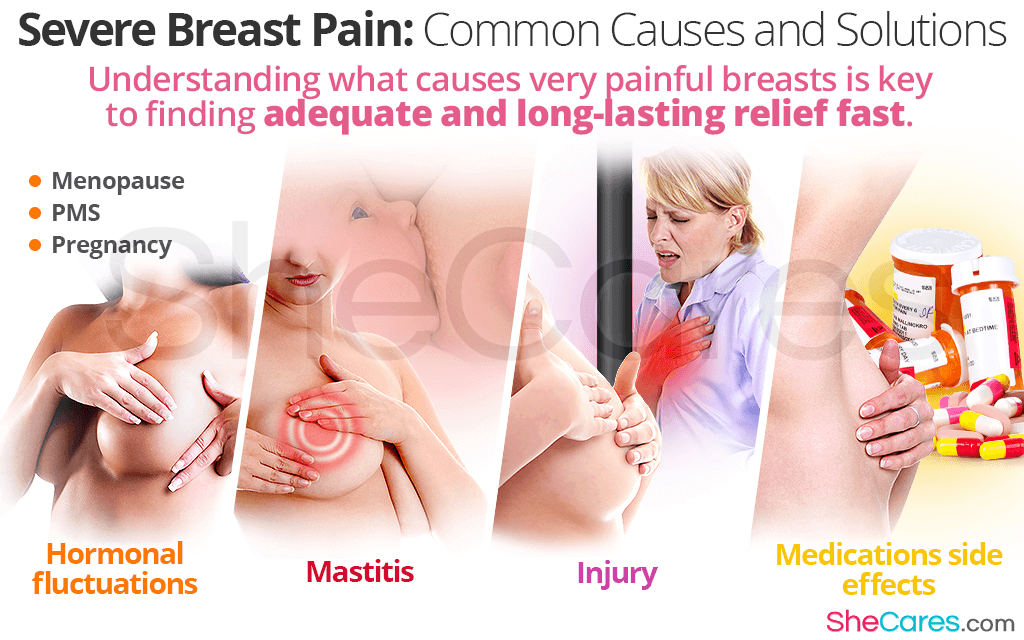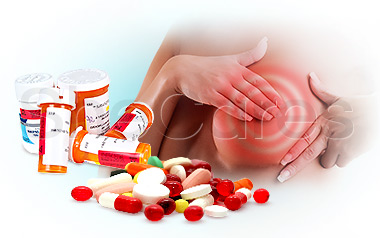Although most women are likely to experience occasional breast pain - known as mastalgia - during their life, most often it is mild and short-lived. Some less fortunate women, however, suffer from severe pain in the breast, which leads them on a desperate search for what might be causing it and how to reduce it.
Keep on reading to learn all about severe breast pain, including possible causes and the most effective solutions, to get yourself a step closer to finding long-lasting relief.
Causes of Severe Breast Pain
There are many factors that can cause mastalgia, which may start as mild pain and progress into intense breast pain. The most common causes include, but are not limited to, the following:
Hormonal fluctuations
Breast pain due to hormonal shifts is called cyclical mastalgia. It occurs before a period in more or less predictable patterns, affects both breasts, lasts for a week or longer, and is considered a part of premenstrual syndrome (PMS). Intense breast pain is also common during perimenopause and pregnancy, other life stages known for rapid hormonal fluctuations.
Mastitis
Mastitis, an inflammation of the breast caused by clogged milk ducts, is most common in women who breastfeed, but it can also occur in non-nursing women due to a bacterial infection that enters the breast tissue through a cracked nipple or piercing.1 It can cause severe breast pain and may progress to painful breast abscesses if not properly treated.
Injury
An injury to the breasts due to a fall, strenuous exercise, or other trauma might produce very painful breasts for weeks to come. Also, although it might feel like the pain is originating in the breasts, sometimes pulled or damaged muscles in the back, chest, or arms or inflammation of the cartilage in the chest (costochondritis) might radiate to the breasts.
Medication side effects
Intense breast pain is also often listed as a side effect of various medications, including hormone replacement therapy (HRT), antidepressants, heart medications, oral contraceptives, and some antibiotics.2
Breast cancer
Although women experiencing severe breast pain often almost instantly assume they must be suffering from breast cancer, it is estimated that only 2-7% of women who report noncyclical breast pain actually have cancer.3
Severe Breast Pain Treatment
When faced with intense breast pain, there are a number of treatment and management techniques that might prove effective in relieving the debilitating pain. They may include the following:
Treating the Underlying Cause
The first and most important step in relieving severe breast pain is to address its root cause, including the following:
Hormonal balance. While not recommended in pregnancy, herbal supplements can help women regulate hormones and get through fluctuations with more ease. They include phytoestrogenic supplements, like chasteberry, and hormone-balancing supplements, like Macafem. A low-fat and fiber-rich diet is also key.4
Medications. If breast pain is a result of mastitis, the most appropriate treatment method is with antibiotics. If the pain is a side effect of medications, asking a doctor to safely switch the drugs might bring quick relief. It is never advisable to stop or change the dosage of medications without prior approval from a doctor.
Relieving the Pain
Although not addressing the root cause of very painful breasts, numerous pain-relieving strategies can help women deal with the pain while they are undergoing proper treatment. They include:
Heating pads. The use of a hot water bottle or microwavable heating pad can provide comfort and relief from intense breast pain.
Reduce stress. Especially effective in relieving cyclical breast pain are stress-relieving techniques, which lower cortisol levels and promote relaxation. Options include deep breathing exercises, aromatherapy, or acupuncture.
Proper bras. Purchasing a well-supported and comfortable bra is essential not only for managing severe breast pain, but for overall breast health. A sports bra during exercise is also key to alleviating the pain.
Pain relievers. Many women might temporarily benefit from oral analgesics, like ibuprofen or acetaminophen, for quick and easy pain relief. Long-term use, however, might come with side effects.
Conclusions
It can be upsetting and difficult to live with very painful breasts, especially for 1 in 5 women whose condition is severe enough to impact daily activities and overall outlook on life.5 Having a clear understanding of what causes this pesky symptom is key to finding relief fast and long-term, including effective approaches to balancing hormones naturally and re-gaining control over one's body and mind.
Sources
- John Hopkins Medicine. (n.d.). Breast Pain (Mastalgia). Retrieved November 5, 2019 from https://www.hopkinsmedicine.org/health/conditions-and-diseases/mastalgia-breast-pain
- NHS. (2019). Mastitis. Retrieved November 5, 2019 from http://www.nhs.uk/conditions/mastitis/Pages/Introduction.aspx
- National Health Service UK. (2016). Breast pain. Retrieved November 5, 2019 from http://www.nhs.uk/Conditions/breastpaincyclical/Pages/Introduction.aspx#injury
Footnotes:
- Better Health Channel. (2012). Breastfeeding - dealing with mastitis. Retrieved November 5, 2019 from https://www.betterhealth.vic.gov.au/health/HealthyLiving/breastfeeding-dealing-with-mastitis
- Mayo Clinic. (2019). Breast Pain. Retrieved November 5, 2019 from https://www.mayoclinic.org/diseases-conditions/breast-pain/symptoms-causes/syc-20350423
- Harvard Medical School. (2018). Breast pain: Not just a premenopausal complaint. Retrieved November 5, 2019 from https://www.health.harvard.edu/pain/breast-pain-not-just-a-premenopausal-complaint
- Breast Cancer Now. (2018). Breast pain. Retrieved November 5, 2019 from https://breastcancernow.org/information-support/have-i-got-breast-cancer/benign-breast-conditions/breast-pain
- Cleveland Clinic. (2014). Breast Pain (Mastalgia). Retrieved November 5, 2019 from https://my.clevelandclinic.org/health/diseases/15469-breast-pain-mastalgia

